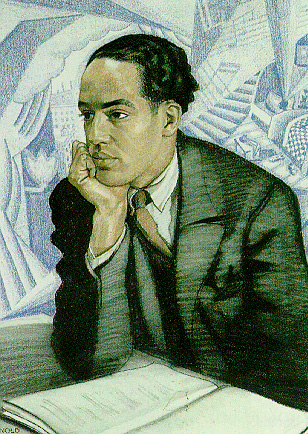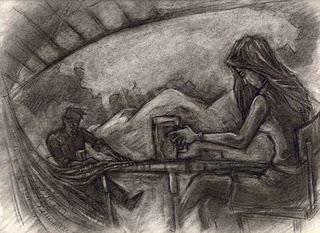Candy said, “George.”
“Huh?”
“I oughtta of shot that dog myself, George. I shouldn’t oughtta of let no stranger shoot my dog.”
–Of Mice and Men, p. 61
Lennie begged, “Le’s do it now. Le’s get that place now.”
“Sure, right now. I gotta. We gotta.”
And George raised the gun and steadied it, and he brought the muzzle of it close to the back of Lennie’s head. The hand shook violently, but his face set and his hand steadied. He pulled the trigger.
-Of Mice and Men, p. 106
I knew I was in store for the reading experience of a lifetime after the class hyped up the ending and struggled to not delve into a discussion of the latter part of the novel—particularly, the tragically gorgeous finale. Seems like the story escalates exponentially, moving slowly at first with the tranquility of the riverside, then spiraling to a atrociously depressing (yet absolutely beautiful) climax on the final page as George shoots Lennie in that same riverside clearing. It all comes full circle in a sick and twisted way. I knew something really fucked up was going to happen, but of all my dark and morbid speculations I never expected the novel to end like this, which is a good thing. Steinbeck manages to capture the Great Depression in a mere hundred-and-seven pages, both in the historical and the visceral sense. On one level, the novella is about the economic hardships that drove thousands of men to leave home in search of whatever work they could get: migrant workers.
Perhaps on a deeper level, the story’s pathos vibrates with a stark loneliness, the sense of desperate isolation that terrorizes not only the migrant workers, but also women and African Americans like Crooks and Curley’s unnamed wife. Crooks, Curley’s wife, and Candy find themselves alone, even if they’re surrounded by other workers or a husband, and all three of them have a particularly strong urge to connect with other people. “I ain’t got a right to talk to nobody? Whatta they think I am, anyways?” Curley’s wife exclaims on multiple occasions, evoking her bitter lonesomeness (87). Similarly—yet ironically due to the tense interaction between Crooks and Curely’s wife—Crooks tells Lennie morosely, “A guy goes nuts if he ain’t got nobody. Don’t make no difference who the guy is, long’s he’s with you. I tell ya,” he cried, “I tell ya a guy gets too lonely an’ he gets sick.” Crooks is the only black man on the property and is one of the few remaining African American’s left in the city of Soledad, leaving him isolated in a shack with nobody to interact with but racist whites and books. Crooks is torn on the inside, seeing as he wants to connect with someone else but at the same time he cannot come to grips with the terrible way the whites treat him; so though he wants company in his shack, he ardently defends his ground like he’s defending the only piece of identity that he has left. I wanted to know exactly where in the central valley the city of Soledad is, and upon ‘Wikipedia’ing’ it I realized that Soledad translates to loneliness in Spanish (something I should have known after 6 years of Spanish in jr. high and high school!).
I should probably address the two quotes that I slung up at the top of the page instead of continuing with that line of thought, although this theme of loneliness is pertinent to the two quotes and the subject matter they entail. Like I said, I never would have expected George to do what he did on those thrilling final pages; to kill his own best pal—his only true friend, the only connection that so many of the other characters long for—is emotionally tormenting. Show me a dead puppy and I cringe; show me a man shooting his mentally handicapped best friend and I implode. Setting down the book after finishing it, I had one burning question: why did George decide to shoot the poor guy rather than let fate take over, perhaps letting him die by the hands of Curley or Carlson? I sat for a while, stunned but frantically trying to piece together what was going on in George’s head to make him do that, and how he could even work up the nerve to be the one to end Lennie’s life. Then I remembered the whole incident with Candy’s old mutt and how Carlson said the dog was no good, taking him away and shooting him right in the back of the head (just as George does to Lennie). That’s when I realized why we didn’t want to touch on Candy’s dog too much on Friday: the incident heavily foreshadows the hardships and sorrows that kill their agrarian American dream.
As the first quote above exemplifies, Candy regrets letting Carlson, “a stranger,” end his dog’s life. He wishes that he would have taken the poor mutt out, loved it, given it one final moment of joy and peace, and then ended its life; instead, the highly insensitive Carlson takes the dog’s life. The dog died alone, in a sense, because it died by the hands of a stranger. The way the dog is shot—right in the back of the head at the base of the spine—is the same way George chooses to shoot Lennie, creating a parallel between the “Candy/Candy’s mutt” scenario and the “George/Lennie” scenario, with the only difference being that George was able to take Lennie’s life away rather than letting him die alone at the hands of a cruel and merciless bastard like Curley or Carlson. Thinking about what Candy said regarding his regret at not having taken his dog’s life, George was the one who took Carlson’s missing gun, taking it to meet Lennie where we first met the duo by the riverbank, the tree branch, and the ash heap (again, the cyclical nature of the story). So no matter how much he didn’t want to shoot his friend, he knew “I gotta,” or else Lennie would die alone without George by his side. No doubt about it, as he discussed with Candy and Slim, Lennie has to face the consequences of his actions, so rather than letting Lennie go through the horrible confusion of public execution or the lonesome death he would endure at Curley’s hand, George takes note of Candy’s regrets and beats anyone else to it. He has no choice: either kill Lennie or watch him suffer a much more lonely and depressing death. George won’t stand for that though, so he tells Lennie to “look down there acrost the river, like you can almost see the place”—this “place” being the plot of land they continually dream of (106). By killing him like this, George lets him die in the comfort and peace of their dream, thinking happily of his illusory dream of “tending the rabbits” and living off the fat of the land. It’s tragically beautiful, one of the most visceral reads I’ve had in a while.









